昔日依依别
英汉互译-译文比较-当年我俩分手时
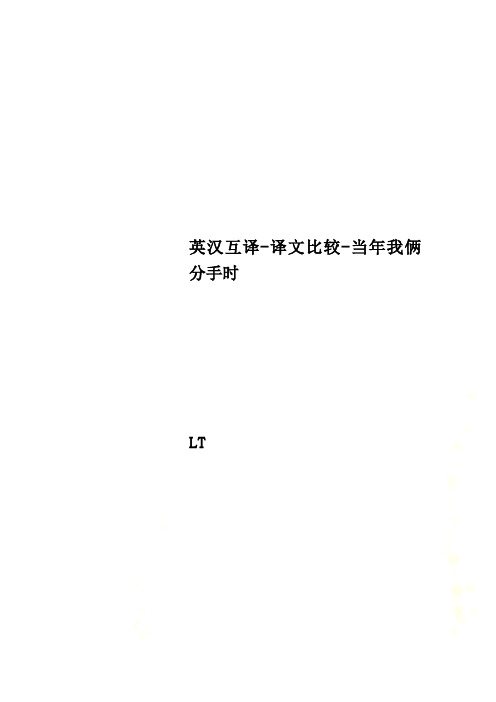
英汉互译-译文比较-当年我俩分手时LTContent1,美诗展示2,原诗鉴赏3,不同译本赏析4,结论5,参考文献1,美诗展示When We Two Parted想当年我们俩分手(卞之琳)When we two parted 想当年我们俩分手,n silence and tears, 也沉默也流泪,Half broken-hearted, 要分开好几个年头To sever for years, 想起来心就碎; Pale grew thy cheek and cold, 苍白,冰冷,你的脸; Colder thy kiss; 更冷是嘴唇; Truly that hour foretold 当年真是像预言Sorrow to this! 今天的悲痛。
The dew of the morning 早晨的寒露在飘荡,Sunk chill on my brow; 冷彻了眉头-It felt like the warning 仿佛是预先警告我Of what i feel now. 今天的感受。
Thy vows are all broken,你抛了所有的信誓,And light is thy fame: 声名也断送;I hear thy name spoken 听人家讲你的名字,And share in its shame. 我也会脸红。
They name thee before me, 人家当我面讲你A knell to mine ear;我听来像丧钟-A shudder comes o’er me- 为什么我从前想像你Why wert thou so dear?值得我这么疼?They know not i knew thee 谁知道我本来认识你,Who knew thee too well:认识得太相熟:-Long,long shall i rue thee 我今后会长久惋惜你,Too deeply to tell. 沉痛到说不出!In secret we met: 你我在秘密中见面In silence i grieve 我如今就默哀hat thy heart could forget, 你怎好忍心来欺骗。
英美经典英文诗歌欣赏
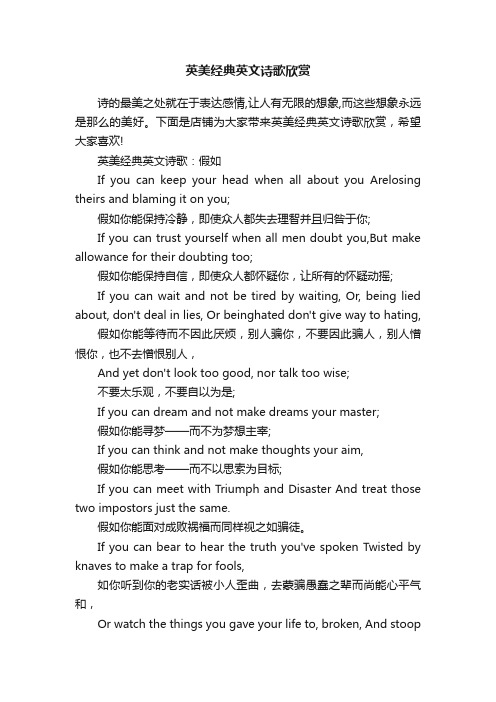
英美经典英文诗歌欣赏诗的最美之处就在于表达感情,让人有无限的想象,而这些想象永远是那么的美好。
下面是店铺为大家带来英美经典英文诗歌欣赏,希望大家喜欢!英美经典英文诗歌:假如If you can keep your head when all about you Arelosing theirs and blaming it on you;假如你能保持冷静,即使众人都失去理智并且归咎于你;If you can trust yourself when all men doubt you,But make allowance for their doubting too;假如你能保持自信,即使众人都怀疑你,让所有的怀疑动摇;If you can wait and not be tired by waiting, Or, being lied about, don't deal in lies, Or beinghated don't give way to hating, 假如你能等待而不因此厌烦,别人骗你,不要因此骗人,别人憎恨你,也不去憎恨别人,And yet don't look too good, nor talk too wise;不要太乐观,不要自以为是;If you can dream and not make dreams your master;假如你能寻梦——而不为梦想主宰;If you can think and not make thoughts your aim,假如你能思考——而不以思索为目标;If you can meet with Triumph and Disaster And treat those two impostors just the same.假如你能面对成败祸福而同样视之如骗徒。
If you can bear to hear the truth you've spoken Twisted by knaves to make a trap for fools,如你听到你的老实话被小人歪曲,去蒙骗愚蠢之辈而尚能心平气和,Or watch the things you gave your life to, broken, And stoopand build'em up with worn-outtools;或者见到你毕生的亊业被毀,而尚能执起破旧的工具去着手重建;If you can make one heap of all your winnings And risk it on one turn of pitch-and-toss,如果在你赢得无数桂冠之后,然后孤注一掷再搏一次,And lose, and start again at your beginnings,And never breathe a word about your loss;失败过后,东山再起,不要抱怨你的失败;If you can force your heart and nerve and sinew To serve your turn long after they are gone,假如你能驱使你的心力和精神,在别人走后,长久地坚守阵地,And so hold on when there is nothing in you Except the Will which says to them: "Hold on!"让你抓牢,尽管你里面己掏空了,只有意志告诉它们“坚持!”If you can talk with crowds and keep your virtue, Or walk with Kings-nor lose the commontouch,假如你能与市井之徒交谈而不失于礼,出入于贵胄之家而不忘苍生黎民,If neither foes nor loving friends can hurt you, If all men count with you, but none too much,假如你能尊重人人而不膜拜何人,既不受制于仇敌亦不受制于亲朋;If you can fill the unforgiving minute With sixty seconds' worth of distance run,假如你能以六十秒长跑去填满不可饶恕的一分钟Yours is the Earth and everything that's in it, And - which is more - you'll be a Man, my son!这个世界的一切都是你的,更重要的是——孩子——你是个顶天立地的人!英美经典英文诗歌:昔日依依别When we two parted In silence and tears,昔日依依惜别,默默无言地流着泪,Half broken-hearted, To sever for years,要分开好几个年头,我们忍不住心碎,Pale grew thy cheek and cold, Colder thy kiss;你的脸冰凉、发白,你的吻更似冷冰;Truly that hour foretold Sorrow to this.呵,那一刻正预兆了我今日的悲痛。
英国文学史名词解释
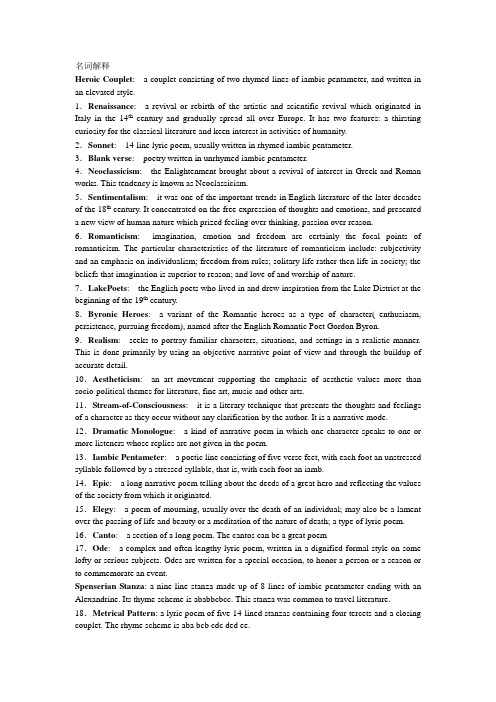
名词解释Heroic Couplet: a couplet consisting of two rhymed lines of iambic pentameter, and written in an elevated style.1.Renaissance: a revival or rebirth of the artistic and scientific revival which originated in Italy in the 14th century and gradually spread all over Europe. It has two features: a thirsting curiosity for the classical literature and keen interest in activities of humanity.2.Sonnet: 14-line lyric poem, usually written in rhymed iambic pentameter.3.Blank verse: poetry written in unrhymed iambic pentameter.4.Neoclassicism: the Enlightenment brought about a revival of interest in Greek and Roman works. This tendency is known as Neoclassicism.5.Sentimentalism: it was one of the important trends in English literature of the later decades of the 18th century. It concentrated on the free expression of thoughts and emotions, and presented a new view of human nature which prized feeling over thinking, passion over reason. 6.Romanticism: imagination, emotion and freedom are certainly the focal points of romanticism. The particular characteristics of the literature of romanticism include: subjectivity and an emphasis on individualism; freedom from rules; solitary life rather then life in society; the beliefs that imagination is superior to reason; and love of and worship of nature. 7.LakePoets: the English poets who lived in and drew inspiration from the Lake District at the beginning of the 19th century.8.Byronic Heroes: a variant of the Romantic heroes as a type of character( enthusiasm, persistence, pursuing freedom), named after the English Romantic Poet Gordon Byron. 9.Realism: seeks to portray familiar characters, situations, and settings in a realistic manner. This is done primarily by using an objective narrative point of view and through the buildup of accurate detail.10.Aestheticism: an art movement supporting the emphasis of aesthetic values more than socio-political themes for literature, fine art, music and other arts.11.Stream-of-Consciousness: it is a literary technique that presents the thoughts and feelings of a character as they occur without any clarification by the author. It is a narrative mode. 12.Dramatic Monologue: a kind of narrative poem in which one character speaks to one or more listeners whose replies are not given in the poem.13.Iambic Pentameter: a poetic line consisting of five verse feet, with each foot an unstressed syllable followed by a stressed syllable, that is, with each foot an iamb.14.Epic: a long narrative poem telling about the deeds of a great hero and reflecting the values of the society from which it originated.15.Elegy: a poem of mourning, usually over the death of an individual; may also be a lament over the passing of life and beauty or a meditation of the nature of death; a type of lyric poem. 16.Canto: a section of a long poem. The cantos can be a great poem17.Ode: a complex and often lengthy lyric poem, written in a dignified formal style on some lofty or serious subjects. Odes are written for a special occasion, to honor a person or a season or to commemorate an event.Spenserian Stanza: a nine-line stanza made up of 8 lines of iambic pentameter ending with an Alexandrine. Its thyme scheme is ababbcbcc. This stanza was common to travel literature. 18.Metrical Pattern: a lyric poem of five 14-lined stanzas containing four tercets and a closing couplet. The rhyme scheme is aba bcb cdc ded ee.文学史中古时期1.Beowulf?贝奥武甫?: the natural epic of the English people; Denmark story, alliteration, metaphor, understatements2.Sir Gawain and Green Knight?高文爵士和绿衣骑士?3.Geoffrey Chaucer(杰弗里乔叟〕:the Father of English Poetry; The Canterbury Tales?埃特伯雷故事集?〔24stories)文艺复兴时期1.Thomas More: Utopia?乌托邦?- the communication between more and the traveler which just came back from Utopia.2.Francis Bacon: the first English Essayist; Essays?随笔集?- Of Studies, Of Truth (philosophical and literary works)3.Thus Wyatt: first to introduce the sonnet into English literature.4.Edmund Spenser: Poet's poet; The Fairy Queen?仙后?(to Queen Elizabeth I)5.William Shakespeare:Sonnet 18(Shall I compare thee to a summer's day)17世纪英国文学1.John Donne: the leading poet of Metaphysical school of poetry; A Valediction: Forbidding Mourning?别离:莫忧伤?2.John Milton: Paradise Lost?失乐园?〔a revolt against God's authority), Paradise Regained?复乐园?〔how Christ overcame Santa) ——stories were taken from Bible3.John Bunyan: the son of Renaissance; Pilgrim's Progress?天路历程?(imagination, shadowing, realistic religious allegory)18世纪英国文学Novel:1.the age of reason, classicism, sentimentalism and romanticism (novels, prose, dramas, poetry)2.Daniel Defoe: representative of English realistic novel; Robinson Crusoe?鲁滨逊漂流记?(the development of a young man from a naive and artless youth to a clever and hardened man)3.Jonathan Swift: Gulliver's Travels?格列佛游记?(fictional, satirical- human nature, the European Government, the differences between religions, whole English state system)4.Henry Fielding: the Father of English novel; The History of Tome Jones, a Foundling ?汤姆琼斯?,satiricPoetry:5.Thomas Gray: Elegy Written in a Country Churchyard?墓园挽歌?6.Alexander Pope: perfected in heroic couplet; An Essay on Criticism?论批评?7.William Blake: pre-romantic; Songs of Innonce?天真之歌?,Songs of Experience?经历之歌?-London, The Tiger8.Robert Burns: A Red Red Rose?一朵红红的玫瑰?Drama:9.Richard Brinsley Sheridan:Master of Comedy of manners;The School for Scandal?造谣学校?浪漫主义时期1798-18321.William Wordsworth: the Lake Poets; The Prelude?序曲?;I Wondered Lonely as a Cloud?我似流云天自游?;The Solitary Reaper?孤寂的割麦女?;features: poet of nature and human heart2.Samuel Taylor Coleridge: the first critic of the Romantic school; The Rime of the Ancient Mariner?古舟子咏?3.George Gordon Byron: vigorous, strong and beautiful; Childe Harold's Pilgrimage?恰尔德哈罗尔德游记?(spenserian stanza, fights for liberty); Don Juan?唐璜?(a broad critical picture of European life); When We Two Parted?昔日依依别?;She Walks in Beauty?她走在美的光影中?;The Isles of Greece?哀希腊?4.Percy Bysshe Shelley: Ode to the West Wind?西风颂?-赞颂西风,希望与其严密相连; Prometheus Unbound?解放了的普罗米修斯?(the victory for man's struggle against tyranny and oppression)5.John Keats: sensuous, colorful and rich in imagery; Ode to a Nightingale?夜莺颂?;Ode on a Grecian Urn?希腊古瓮颂?6.Walter Scott: Father of Historical Novel; combine historical fact and romantic imagination7.Jane Austen: wit, dry humour, subtle irony,realistic; Pride and Prejudice?傲慢与偏见?(Elizabeth and Darcy);Sense and Sensibility?理智与情感?;Emma?爱玛?8.Charles Lamb: Poor Relations?穷亲戚?; Dream-children?童年梦幻?; A Reverie?梦想曲?维多利亚时期1.summit:realistic novel2.Charles Dickens: critical realist writer; humour, wit, happy endings; A Tale of Two Cities?双城记?(London & Paris, where there is oppression, there is revolution); David Copperfield?大卫科波菲尔?;Oliver Twist?雾都孤儿?;Hard Time?困难时世?;Great Expectations?远大前程?;Dombey and Son?董贝父子?;Pickwick Papers?匹克威克外传?3.William Makepeace Thackeray: Vanity Fair?名利场?(to satirize the social more, decadence and corruption of his time; to criticize the values measured by wealth)4.George Eliot: novelist, her novels are celebrated for their realism and psychological insights; Adam Bede?亚当比德?(social inequality);The Mill on the Floss?弗洛斯河上的磨坊?;Silas Marner?织工马南?5.Alfred Tennyson: succeeded Wordsworth as Poet Laureate in 1850; Break, Break, Break?拍吧,拍吧,拍吧?;Crossing the Bar?过沙洲?6.Robert Browning: dramatic monologues; My Last Duchess?我已故的公爵夫人?7.The Bronte Sisters:Charlotte: Jane Eyre?简爱?:简·爱是一个心地纯洁、善于思考的女性,她生活在社会底层,受尽磨难。
英国文学选读作家作品
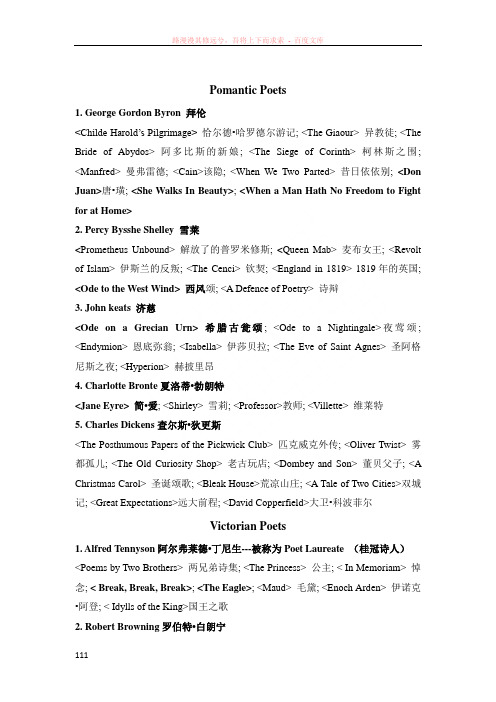
Pomantic Poets1. George Gordon Byron 拜伦<Childe Harold’s Pilgrimage> 恰尔德•哈罗德尔游记; <The Giaour> 异教徒; <The Bride of Abydos> 阿多比斯的新娘; <The Siege of Corinth> 柯林斯之围; <Manfred> 曼弗雷德; <Cain>该隐; <When We Two Parted> 昔日依依别; <Don Juan>唐•璜; <She Walks In Beauty>; <When a Man Hath No Freedom to Fight for at Home>2. Percy Bysshe Shelley 雪莱<Prometheus Unbound> 解放了的普罗米修斯; <Queen Mab> 麦布女王; <Revolt of Islam> 伊斯兰的反叛; <The Cenci> 钦契; <England in 1819> 1819年的英国; <Ode to the West Wind> 西风颂; <A Defence of Poetry> 诗辩3. John keats 济慈<Ode on a Grecian Urn> 希腊古瓮颂; <Ode to a Nightingale>夜莺颂; <Endymion> 恩底弥翁; <Isabella> 伊莎贝拉; <The Eve of Saint Agnes> 圣阿格尼斯之夜; <Hyperion> 赫披里昂4. Charlotte Bronte夏洛蒂•勃朗特<Jane Eyre> 简•爱; <Shirley> 雪莉; <Professor>教师; <Villette> 维莱特5. Charles Dickens查尔斯•狄更斯<The Posthumous Papers of the Pickwick Club> 匹克威克外传; <Oliver Twist> 雾都孤儿; <The Old Curiosity Shop> 老古玩店; <Dombey and Son> 董贝父子; <A Christmas Carol> 圣诞颂歌; <Bleak House>荒凉山庄; <A Tale of Two Cities>双城记; <Great Expectations>远大前程; <David Copperfield>大卫•科波菲尔Victorian Poets1. Alfred Tennyson阿尔弗莱德•丁尼生---被称为Poet Laureate (桂冠诗人)<Poems by Two Brothers> 两兄弟诗集; <The Princess> 公主; < In Memoriam> 悼念; < Break, Break, Break>; <The Eagle>; <Maud> 毛黛; <Enoch Arden> 伊诺克•阿登; < Idylls of the King>国王之歌2. Robert Browning罗伯特•白朗宁< My Last Dutchess> 我已故的公爵夫人; <Paracelsus> 巴拉塞尔士; <Strafford> 斯特拉福; <Pippa Passes> 皮帕走过了; <Dramatic Lyrics> 戏剧抒情诗; < Dramatic Romance and Lyrics> 戏剧传奇及抒情诗; <Men and Women> 男男女女; <Dramatic Personae> 剧中人物; <The Ring and the Book> 指环与书3. Matthew Arnold 马修•阿诺德<The Strayed Reveller> 迷途浪子; <Poems> 诗集; <Poems: Second Series> 诗歌二集; <New Poems> 新诗集; <Essays in Criticism> 评诗集; <Culture and Anarchy> 文化与无政府; <Literature and Dogma> 文学与教条; <Dover Beach> 多福海滩4. Thomas Hardy托马斯•哈代---(小说多以农村生活为背景;自然主义小说家。
最经典优美的英文诗短篇欣赏
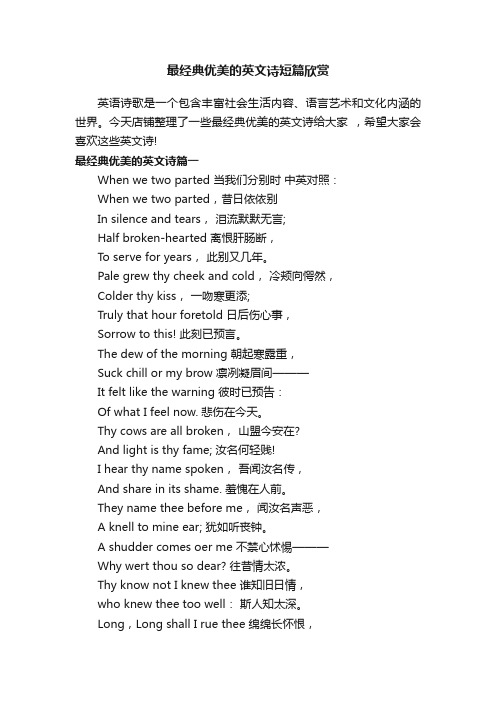
最经典优美的英文诗短篇欣赏英语诗歌是一个包含丰富社会生活内容、语言艺术和文化内涵的世界。
今天店铺整理了一些最经典优美的英文诗给大家,希望大家会喜欢这些英文诗!最经典优美的英文诗篇一When we two parted 当我们分别时中英对照:When we two parted,昔日依依别In silence and tears,泪流默默无言;Half broken-hearted 离恨肝肠断,To serve for years,此别又几年。
Pale grew thy cheek and cold,冷颊向愕然,Colder thy kiss,一吻寒更添;Truly that hour foretold 日后伤心事,Sorrow to this! 此刻已预言。
The dew of the morning 朝起寒露重,Suck chill or my brow 凛冽凝眉间———It felt like the warning 彼时已预告:Of what I feel now. 悲伤在今天。
Thy cows are all broken,山盟今安在?And light is thy fame; 汝名何轻贱!I hear thy name spoken,吾闻汝名传,And share in its shame. 羞愧在人前。
They name thee before me,闻汝名声恶,A knell to mine ear; 犹如听丧钟。
A shudder comes oer me 不禁心怵惕———Why wert thou so dear? 往昔情太浓。
Thy know not I knew thee 谁知旧日情,who knew thee too well:斯人知太深。
Long,Long shall I rue thee 绵绵长怀恨,Too deeply to tell. 尽在不言中。
In secret we met—昔日喜幽会,In silence I grieve 今朝恨无声。
语域理论与语篇翻译

语域理论与语篇翻译一、语域与语篇翻译语域理论包括语场、语旨和语式三个方面的内容。
语场指实际发生的事情,包括语言发生环境、谈话话题以及参与讲话者的整个活动;语式指语言交际的渠道或媒介;语旨指参与讲话者之间的角色关系。
20世纪90年代,哈的姆和梅森等人将语域概念引入翻译研究中。
他们认为,语篇含义并不仅仅由语言体系自身决定,而是由整个语篇的情景语境和交际功能来决定,翻译过程中所追求的,不能只是脱离语境形式上的对等,或是单纯语义等值,而是和语境或语域密切相关的交际功能的等值。
将语域理论引入翻译领域,可以为我们提供一种描述某些超语言因素的规范,帮助我们在翻译中成功地实现意义转换(周俊青,1996:11)。
语域理论给文本分析提供了一个理论框架,而译者对源语语篇文本的理解,显然受到源语语篇语场、语旨、语式的影响。
同样,译者在生成目的语语篇时,也受到以上因素的制约。
译者要翻译一个语篇,必然首先是源语言语篇的阅读者,同时是目标语篇的生成者,译者很自然地成为了联系源语言语篇和目标文本语篇的纽带,无论是源语语篇的解读,还是其后目的语语篇的生成,都是在构建相应的语篇语境的过程中完成的(刘兴林,2005:67)。
因此,要达到交际目的,译者必须正确分析、转化语域。
本文将通过具体的例句,说明语域三要素是如何能够影响并指导翻译过程的。
二、不同语域类型的语篇翻译翻译涉及到两种语言和两种不同文化背景的参与者。
在翻译过程中,对语篇语场、语式和语旨的认识和把握,是译者决策及操作中的三个重要因素;三者相辅相成,保证信息传译中的适切。
就语篇的语域而言,译者面临两个任务。
第一,作为读者,他必须对源语语篇的语场、语式和语旨在篇章、句群及信息单元等语篇基层上的具体体现有一个全面的认识。
第二,他必须对译语语篇的相应特点,尤其是不同于源语语篇之处,有清楚的了解。
(李运兴,2001:67)(一)不同语场的语篇翻译因为使用的领域和目的不同而产生不同类型的语篇,比如文学、新闻、广告语篇的翻译,不同领域的文本总有一套独有的语言系统,包括一些常用词汇、句式、语法结构和语篇模式,这就要求译者对不同语言中同种语场的联系与区别做到心中有数,以便更好地实现两种语言的转换。
依依送别的诗句大全-送别经典诗句

依依送别的诗句大全-送别经典诗句许多文人墨客对于离别总是歌吟不绝。
在这浓浓的感伤之外,往往还有其他寄寓:或用以激励劝勉,或用以抒发友情,或用于寄托诗人自己的理想抱负。
今天小编在这给大家整理了一些关于描写送别的著名诗句,我们一起来看看吧!描写送别的著名诗句1、怕黄昏忽地又黄昏,不销魂怎地不销魂。
——王实甫《十二月过尧民歌·别情》2、南浦凄凄别,西风袅袅秋。
——白居易《南浦别》3、河桥送人处,凉夜何其。
——周邦彦《夜飞鹊·河桥送人处》4、醉别复几日,登临遍池台。
——李白《鲁郡东石门送杜二甫》5、楼头小妇鸣筝坐,遥见飞尘入建章。
——王昌龄《青楼曲二首》6、万里辞家事鼓鼙,金陵驿路楚云西。
——刘长卿《送李判官之润州行营》7、只言啼鸟堪求侣,无那春风欲送行。
——高适《夜别韦司士》8、难相见,易相别,又是玉楼花似雪。
——韦庄《应天长·别来半岁音书绝》9、春草明年绿,王孙归不归?——王维《送别/山中送别/送友》10、入春才七日,离家已二年。
——薛道衡《人日思归》11、今朝此为别,何处还相遇。
——韦应物《初发扬子寄元大校书》12、飞蓬各自远,且尽手中杯。
——李白《鲁郡东石门送杜二甫》13、金陵子弟来相送,欲行不行各尽觞。
——李白《金陵酒肆留别》14、离情被横笛,吹过乱山东。
——王安石《江上》15、已觉逝川伤别念,复看津树隐离舟。
——王勃《秋江送别二首》16、谁言千里自今夕,离梦杳如关塞长。
——薛涛《送友人》17、白白与红红,别是东风情味。
——严蕊《如梦令·道是梨花不是》18、柳条折尽花飞尽,借问行人归不归?——佚名《送别诗》19、离堂思琴瑟,别路绕山川。
——陈子昂《春夜别友人二首·其一》20、别来春半,触目柔肠断。
——李煜《清平乐·别来春半》21、石壕村里夫妻别,泪比长生殿上多。
——袁枚《马嵬》22、不见南师久,谩说北群空。
——陈亮《水调歌头·送章德茂大卿使虏》23、征马分飞日渐斜,见此空为人所嗟。
语域理论与语篇翻译

语域理论与语篇翻译作者:李洁林立红来源:《现代语文(语言研究)》2012年第05期一、语域与语篇翻译语域理论包括语场、语旨和语式三个方面的内容。
语场指实际发生的事情,包括语言发生环境、谈话话题以及参与讲话者的整个活动;语式指语言交际的渠道或媒介;语旨指参与讲话者之间的角色关系。
20世纪90年代,哈的姆和梅森等人将语域概念引入翻译研究中。
他们认为,语篇含义并不仅仅由语言体系自身决定,而是由整个语篇的情景语境和交际功能来决定,翻译过程中所追求的,不能只是脱离语境形式上的对等,或是单纯语义等值,而是和语境或语域密切相关的交际功能的等值。
将语域理论引入翻译领域,可以为我们提供一种描述某些超语言因素的规范,帮助我们在翻译中成功地实现意义转换(周俊青,1996:11)。
语域理论给文本分析提供了一个理论框架,而译者对源语语篇文本的理解,显然受到源语语篇语场、语旨、语式的影响。
同样,译者在生成目的语语篇时,也受到以上因素的制约。
译者要翻译一个语篇,必然首先是源语言语篇的阅读者,同时是目标语篇的生成者,译者很自然地成为了联系源语言语篇和目标文本语篇的纽带,无论是源语语篇的解读,还是其后目的语语篇的生成,都是在构建相应的语篇语境的过程中完成的(刘兴林,2005:67)。
因此,要达到交际目的,译者必须正确分析、转化语域。
本文将通过具体的例句,说明语域三要素是如何能够影响并指导翻译过程的。
二、不同语域类型的语篇翻译翻译涉及到两种语言和两种不同文化背景的参与者。
在翻译过程中,对语篇语场、语式和语旨的认识和把握,是译者决策及操作中的三个重要因素;三者相辅相成,保证信息传译中的适切。
就语篇的语域而言,译者面临两个任务。
第一,作为读者,他必须对源语语篇的语场、语式和语旨在篇章、句群及信息单元等语篇基层上的具体体现有一个全面的认识。
第二,他必须对译语语篇的相应特点,尤其是不同于源语语篇之处,有清楚的了解。
(李运兴,2001:67)(一)不同语场的语篇翻译因为使用的领域和目的不同而产生不同类型的语篇,比如文学、新闻、广告语篇的翻译,不同领域的文本总有一套独有的语言系统,包括一些常用词汇、句式、语法结构和语篇模式,这就要求译者对不同语言中同种语场的联系与区别做到心中有数,以便更好地实现两种语言的转换。
英美文学导论阅读参考书目
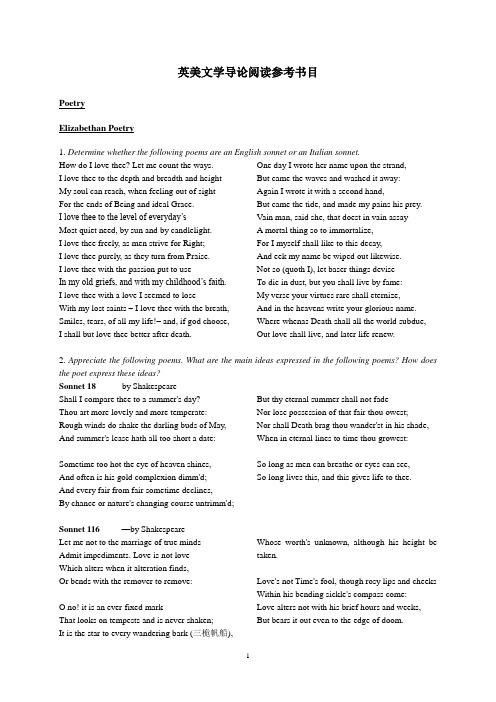
英美文学导论阅读参考书目PoetryElizabethan Poetry1. Determine whether the following poems are an English sonnet or an Italian sonnet.How do I love thee? Let me count the ways.I love thee to the depth and breadth and height My soul can reach, when feeling out of sight For the ends of Being and ideal Grace.I love thee to the level of everyday‘sMost quiet need, by sun and by candlelight.I love thee freely, as men strive for Right;I love thee purely, as they turn from Praise.I love thee with the passion put to useIn my old griefs, and with my childhood‘s faith.I love thee with a love I seemed to loseWith my lost saints – I love thee with the breath, Smiles, tears, of all my life!– and, if god choose, I shall but love thee better after death. One day I wrote her name upon the strand,But came the waves and washed it away: Again I wrote it with a second hand,But came the tide, and made my pains his prey. Vain man, said she, that doest in vain assayA mortal thing so to immortalize,For I myself shall like to this decay,And eek my name be wiped out likewise.Not so (quoth I), let baser things deviseTo die in dust, but you shall live by fame:My verse your virtues rare shall eternize,And in the heavens write your glorious name. Where whenas Death shall all the world subdue, Out love shall live, and later life renew.2. Appreciate the following poems. What are the main ideas expressed in the following poems? How does the poet express these ideas?Sonnet 18by ShakespeareShall I compare thee to a summer's day?Thou art more lovely and more temperate: Rough winds do shake the darling buds of May, And summer's lease hath all too short a date:Sometime too hot the eye of heaven shines,And often is his gold complexion dimm'd;And every fair from fair sometime declines,By chance or nature's changing course untrimm'd; But thy eternal summer shall not fadeNor lose possession of that fair thou owest;Nor shall Death brag thou wander'st in his shade, When in eternal lines to time thou growest:So long as men can breathe or eyes can see,So long lives this, and this gives life to thee.Sonnet 116—by ShakespeareLet me not to the marriage of true mindsAdmit impediments. Love is not loveWhich alters when it alteration finds,Or bends with the remover to remove:O no! it is an ever-fixed markThat looks on tempests and is never shaken;It is the star to every wandering bark (三桅帆船), Whose worth's unknown, although his height be taken.Love's not Time's fool, though rosy lips and cheeks Within his bending sickle's compass come:Love alters not with his brief hours and weeks, But bears it out even to the edge of doom.If this be error and upon me proved, I never writ, nor no man ever loved.The Bargain-- Sir Philip SidneyMy true love hath my heart, and I have his, By just exchange one for another given:I hold his dear, and mine he cannot miss, There never was a better bargain driven: My true love hath my heart, and I have his. His heart in me keeps him and me in one,My heart in him his thoughts and senses guides: He loves my heart, for once it was his own,I cherish his because in me it bides:My true love hath my heart, and I have his.Song: to Celia--by Ben JonsonDrink to me, only with thine eyes,And I will pledge with mine ;Or leave a kiss but in the cup,And I'll not look for wine.The thirst, that from the soul doth rise, Doth ask a drink divine :But might I of Jove's nectar sup (god‘s wine),I would not change for thine. I sent thee late a rosy wreath,Not so much honoring thee, As giving it a hope, that thereIt could not wither'd be.But thou thereon didst only breathe, And sent'st it back to me :Since when it grows, and smells, I swear, Not of itself, but thee.Go and Catch a Falling Star -- by John DonneGo and catch a falling star,Get with child a mandrake root,Tell me where all past years are,Or who cleft the Devil’s foot, Teach me to hear mermaids singing, Or to keep off envy’s stinging,And findWhat windServes to advance an honest mind.If thou be‘st born to strange sights, Things invisible to see,Ride ten thousand days and nights, Till age snow white hairs on thee; Thou, when thou return‘st, wilt tell me All strange wonders that befell thee, And swearNo whereLives a woman true, and fair.If thou find‘st one, let me know, Such a pilgrimage were sweet; Yet do not, I would not go,Though at next door we might meet: Though she were true, when you met her, And last, till you write your letter,Yet sheWill beFalse, ere I come, to two or three.Compare Sidney and Shakespeare‘s poems with that of Donne, what is the difference in central idea?Romantic Poetry AppreciationI Wandered Lonely as a Cloud-- by WordsworthI wandered lonely as a cloudThat floats on high o'er vales and hills,When all at once I saw a crowd,A host, of golden daffodils;Beside the lake, beneath the trees,Fluttering and dancing in the breeze.Continuous as the stars that shineAnd twinkle on the milky way,They stretched in never-ending lineAlong the margin of a bay:Ten thousand saw I at a glance,Tossing their heads in sprightly dance.The waves beside them danced; but theyOut-did the sparkling waves in glee:A poet could not but be gay,In such a jocund company:I gazed---and gazed---but little thoughtWhat wealth the show to me had brought:For oft, when on my couch I lieIn vacant or in pensive mood,They flash upon that inward eyeWhich is the bliss of solitude;And then my heart with pleasure fills,And dances with the daffodils.Questions:1.What scenery has been described in this poem?2.What feeling does that scenery bring to the poet?3.What images reflect the poet‘s feeling and which words help to build up the images?4.What is the main idea of the last stanza?5.What features of writing of Wordsworth does this poem reveal?Kubla KhanIn Xanadu did Kubla KhanA stately pleasure-dome decree:Where Alph, the sacred river, ranThrough caverns measureless to manDown to a sunless sea.So twice five miles of fertile groundWith walls and towers were girdled round:And there were gardens bright with sinuous rills,Where blossomed many an incense-bearing tree;And here were forests ancient as the hills,Enfolding sunny spots of greenery.But oh! that deep romantic chasm which slantedDown the green hill athwart a cedarn cover!A savage place! as holy and enchantedAs e'er beneath a waning moon was hauntedBy woman wailing for her demon-lover!And from this chasm, with ceaseless turmoil seething,As if this earth in fast thick pants were breathing,A mighty fountain momently was forced:Amid whose swift half-intermitted burstHuge fragments vaulted like rebounding hail,Or chaffy grain beneath the thresher's flail:And 'mid these dancing rocks at once and everIt flung up momently the sacred river.Five miles meandering with a mazy motionThrough wood and dale the sacred river ran,Then reached the caverns measureless to man,And sank in tumult to a lifeless ocean:And 'mid this tumult Kubla heard from farAncestral voices prophesying war!The shadow of the dome of pleasureFloated midway on the waves;Where was heard the mingled measureFrom the fountain and the caves.It was a miracle of rare device,A sunny pleasure-dome with caves of ice!A damsel with a dulcimerIn a vision once I saw:It was an Abyssinian maid,And on her dulcimer she played,Singing of Mount Abora.Could I revive within meHer symphony and song,To such a deep delight 'twould win meThat with music loud and longI would build that dome in air,That sunny dome! those caves of ice!And all who heard should see them there,And all should cry, Beware! Beware!His flashing eyes, his floating hair!Weave a circle round him thrice,And close your eyes with holy dread,For he on honey-dew hath fedAnd drunk the milk of Paradise.When We Two Parted(《昔日依依别》)When we two parted昔日依依惜别,In silence and tears,泪流默默无言;Half broken-hearted 离恨肝肠断,To sever for years,此别又几年。
经典的伤感优美的英文小诗欣赏
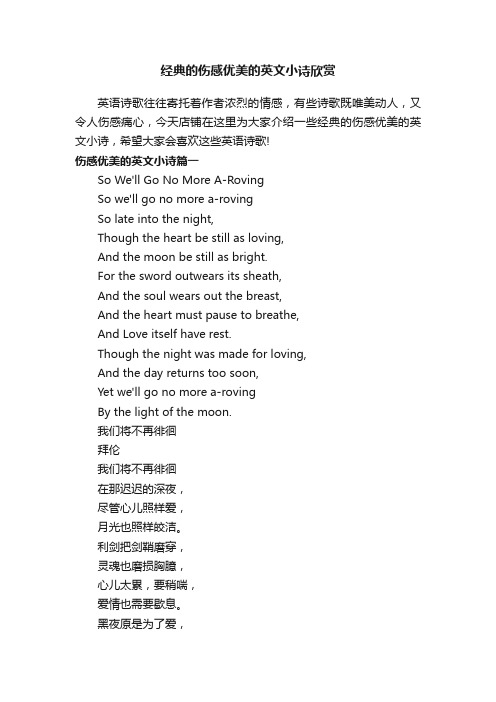
经典的伤感优美的英文小诗欣赏英语诗歌往往寄托着作者浓烈的情感,有些诗歌既唯美动人,又令人伤感痛心,今天店铺在这里为大家介绍一些经典的伤感优美的英文小诗,希望大家会喜欢这些英语诗歌!伤感优美的英文小诗篇一So We'll Go No More A-RovingSo we'll go no more a-rovingSo late into the night,Though the heart be still as loving,And the moon be still as bright.For the sword outwears its sheath,And the soul wears out the breast,And the heart must pause to breathe,And Love itself have rest.Though the night was made for loving,And the day returns too soon,Yet we'll go no more a-rovingBy the light of the moon.我们将不再徘徊拜伦我们将不再徘徊在那迟迟的深夜,尽管心儿照样爱,月光也照样皎洁。
利剑把剑鞘磨穿,灵魂也磨损胸臆,心儿太累,要稍喘,爱情也需要歇息。
黑夜原是为了爱,白昼转眼就回还,但我们不再徘徊沐着那月光一片。
杨德豫译经典的伤感优美的英文小诗篇二Bright SmileWhose smile is it? It’s so sweet, so deepAnd so round! Strings of pearls, small ones,Big ones, all sparkle with innocence!Emerging from spring, it floats to the surfaceAnd brightlyScatters around!Whose smile is it? It’s like a flower blossom,Graceful, not disturbing a soul!The mindless, subtle fragrance drifts with wind,Whiffs over a low wall, and sojournsIn the airAround the sun.Whose smile is it? It built this hundred story towerWith unknown birds flying around? Whose smile Is it?It made tens of thousands of wind bells ringFrom the eaves of colored glazes layersAll the way upInto the sky?林徽音 (Lin Huiyin)深笑是谁笑得那样甜,那样深,那样圆转?一串一串明珠大小闪着光亮,迸出天真!清泉底浮动,泛流到水面上,灿烂,分散!是谁笑得好花儿开了一朵?那样轻盈,不惊起谁。
英国文学史名词解释
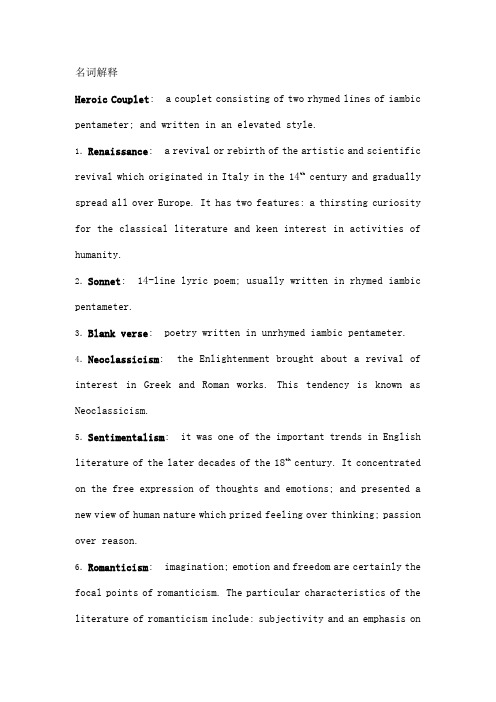
名词解释Heroic Couplet: a couplet consisting of two rhymed lines of iambic pentameter; and written in an elevated style.1.Renaissance: a revival or rebirth of the artistic and scientific revival which originated in Italy in the 14th century and gradually spread all over Europe. It has two features: a thirsting curiosity for the classical literature and keen interest in activities of humanity.2.Sonnet: 14-line lyric poem; usually written in rhymed iambic pentameter.3.Blank verse: poetry written in unrhymed iambic pentameter. 4.Neoclassicism: the Enlightenment brought about a revival of interest in Greek and Roman works. This tendency is known as Neoclassicism.5.Sentimentalism: it was one of the important trends in English literature of the later decades of the 18th century. It concentrated on the free expression of thoughts and emotions; and presented a new view of human nature which prized feeling over thinking; passion over reason.6.Romanticism: imagination; emotion and freedom are certainly the focal points of romanticism. The particular characteristics of the literature of romanticism include: subjectivity and an emphasis onindividualism; freedom from rules; solitary life rather then life in society; the beliefs that imagination is superior to reason; and love of and worship of nature.7.Lake Poets: the English poets who lived in and drew inspiration from the Lake District at the beginning of the 19th century. 8.Byronic Heroes: a variant of the Romantic heroes as a type of character enthusiasm; persistence; pursuing freedom; named after the English Romantic Poet Gordon Byron.9.Realism: seeks to portray familiar characters; situations; and settings in a realistic manner. This is done primarily by using an objective narrative point of view and through the buildup of accurate detail.10.Aestheticism: an art movement supporting the emphasis of aesthetic values more than socio-political themes for literature; fine art; music and other arts.11.Stream-of-Consciousness: it is a literary technique that presents the thoughts and feelings of a character as they occur without any clarification by the author. It is a narrative mode. 12.Dramatic Monologue: a kind of narrative poem in which one character speaks to one or more listeners whose replies are not given in the poem.13.Iambic Pentameter: a poetic line consisting of five verse feet;with each foot an unstressed syllable followed by a stressed syllable; that is; with each foot an iamb.14.Epic: a long narrative poem telling about the deeds of a great hero and reflecting the values of the society from which it originated.15.Elegy: a poem of mourning; usually over the death of an individual; may also be a lament over the passing of life and beauty or a meditation of the nature of death; a type of lyric poem. 16.Canto: a section of a long poem. The cantos can be a great poem 17.Ode: a complex and often lengthy lyric poem; written in a dignified formal style on some lofty or serious subjects. Odes are written for a special occasion; to honor a person or a season or to commemorate an event.Spenserian Stanza: a nine-line stanza made up of 8 lines of iambic pentameter ending with an Alexandrine. Its thyme scheme is ababbcbcc. This stanza was common to travel literature.18.Metrical Pattern: a lyric poem of five 14-lined stanzas containing four tercets and a closing couplet. The rhyme scheme is aba bcb cdc ded ee.文学史中古时期1.Beowulf贝奥武甫: the natural epic of the English people; Denmarkstory; alliteration; metaphor; understatements2.Sir Gawain and Green Knight高文爵士和绿衣骑士3.Geoffrey Chaucer杰弗里乔叟:the Father of English Poetry; The Canterbury Tales埃特伯雷故事集24stories文艺复兴时期1.Thomas More: Utopia乌托邦- the communication between more and the traveler which just came back from Utopia.2.Francis Bacon: the first English Essayist; Essays随笔集- Of Studies; Of Truth philosophical and literary works3.Thus Wyatt: first to introduce the sonnet into English literature.4.Edmund Spenser: Poet's poet; The Fairy Queen仙后to Queen Elizabeth I5.William Shakespeare:Sonnet 18Shall I compare thee to a summer's day17世纪英国文学1.John Donne: the leading poet of Metaphysical school of poetry;A Valediction: Forbidding Mourning分离:莫忧伤2.John Milton: Paradise Lost失乐园a revolt against God's authority; Paradise Regained复乐园how Christ overcame Santa ——stories were taken from Bible3.John Bunyan: the son of Renaissance; Pilgrim's Progress天路历程imagination; shadowing; realistic religious allegory18世纪英国文学Novel:1.the age of reason; classicism; sentimentalism and romanticism novels; prose; dramas; poetry2.Daniel Defoe: representative of English realistic novel; Robinson Crusoe鲁滨逊漂流记the development of a young man from a naive and artless youth to a clever and hardened man3.Jonathan Swift: Gulliver's Travels格列佛游记fictional; satirical- human nature; the European Government; the differences between religions; whole English state system4.Henry Fielding: the Father of English novel; The History of Tome Jones; a Foundling 汤姆琼斯;satiricPoetry:5.Thomas Gray: Elegy Written in a Country Churchyard墓园挽歌6.Alexander Pope: perfected in heroic couplet; An Essay on Criticism论批评7.William Blake: pre-romantic; Songs of Innonce天真之歌;Songs of Experience经验之歌-London; The Tiger8.Robert Burns: A Red Red Rose一朵红红的玫瑰Drama:9.Richard Brinsley Sheridan:Master of Comedy of manners;The Schoolfor Scandal造谣学校浪漫主义时期1798-18321.William Wordsworth: the Lake Poets; The Prelude序曲;I Wondered Lonely as a Cloud我似流云天自游;The Solitary Reaper孤寂的割麦女;features: poet of nature and human heart2.Samuel Taylor Coleridge: the first critic of the Romantic school; The Rime of the Ancient Mariner古舟子咏3.George Gordon Byron: vigorous; strong and beautiful; Childe Harold's Pilgrimage恰尔德哈罗尔德游记spenserian stanza; fights for liberty; Don Juan唐璜a broad critical picture of European life; When We Two Parted昔日依依别;She Walks in Beauty她走在美的光影中;The Isles of Greece哀希腊4.Percy Bysshe Shelley: Ode to the West Wind西风颂-赞颂西风;希望与其紧密相连; Prometheus Unbound解放了的普罗米修斯the victory for man's struggle against tyranny and oppression5.John Keats: sensuous; colorful and rich in imagery; Ode to a Nightingale夜莺颂;Ode on a Grecian Urn希腊古瓮颂6.Walter Scott: Father of Historical Novel; combine historical fact and romantic imagination7.Jane Austen: wit; dry humour; subtle irony;realistic; Pride and Prejudice傲慢与偏见Elizabeth and Darcy;Sense and Sensibility理智与情感;Emma爱玛8.Charles Lamb: Poor Relations穷亲戚; Dream-children童年梦幻; A Reverie幻想曲维多利亚时期1.summit: realistic novel2.Charles Dickens: critical realist writer; humour; wit; happy endings; A Tale of Two Cities双城记London & Paris; where there is oppression; there is revolution; David Copperfield大卫科波菲尔;Oliver Twist雾都孤儿;Hard Time艰难时世;Great Expectations远大前程; Dombey and Son董贝父子;Pickwick Papers匹克威克外传3.William Makepeace Thackeray: Vanity Fair名利场to satirize the social more; decadence and corruption of his time; to criticize the values measured by wealth4.George Eliot: novelist; her novels are celebrated for their realism and psychological insights; Adam Bede亚当比德social inequality;The Mill on the Floss弗洛斯河上的磨坊; Silas Marner 织工马南5.Alfred Tennyson: succeeded Wordsworth as Poet Laureate in 1850; Break; Break; Break拍吧;拍吧;拍吧;Crossing the Bar过沙洲6.Robert Browning: dramatic monologues; My Last Duchess我已故的公爵夫人7.The Bronte Sisters:Charlotte: Jane Eyre简爱:简·爱是一个心地纯洁、善于思考的女性;她生活在社会底层;受尽磨难..但她有倔强的性格和勇于追求平等幸福的精神..小说以浓郁抒情的笔法和深刻细腻的心理描写;引人入胜地展示了男女主人公曲折起伏的爱情经历;歌颂了摆脱一切旧习俗和偏见..扎根于相互理解、相互尊重的基础之上的深挚爱情;具有强烈的震撼心灵的艺术力量..其最为成功之处在于塑造了一个敢于反抗;敢于争取自由和平等地位的妇女形象..Emily: Wuthering Heights呼啸山庄:描写吉卜赛弃儿希斯克利夫被山庄老主人收养后;因受辱和恋爱不遂;外出致富;回来后对与其女友凯瑟琳结婚的地主林顿及其子女进行报复的故事..Anne: Agnes Gray安格尼斯格雷20世纪英国文学1.Thomas Hardy: feature:past and modern; critical; realism; determinism; Tess of The D'urbervillles德伯家的苔丝;Jude the Obscure无名的裘德2.John Galsworthy: From the Four Winds四季的风;The Man of Property 有产业的人;The Silver Box银盒3.George Bernard Shaw: structurally and thematically; vividly; Mrs Warren's Profession华伦夫人的职业;Pygmalion皮革马利翁transform a cockney-speaking flower girl into a woman as poised andwell-spoken as a duchess; The Apple Cart苹果车4.Oscar Wilde: aestheticism; The Happy Prince and Other Tales快乐王子;The Picture of Dorian Gray道林格雷的画像5.D.H. Lawrence: first introduce themes of psychology into his works; Sons and Lovers儿子和情人; The White Peacock白孔雀6.Virginia Woolf: stream-of- consciousness; feminist; To the Lighthouse到灯塔去;Mrs Dalloway达洛维夫人7.James Joyce: Ulysses尤利西斯stream of consciousness; a modern prose epic; Dubliners都柏林人。
诗歌赏析(when we two parted)

In secret we metIn silence I grieve, That thy heart could forget, Thy spirit deceive. If I should meet thee After long years, How should I greet thee? With silence and tears.
The dew of the morning Sunk chill on my browIt felt like the warning Of what I feel now. Thy vows are all broken, And light is thy fame: I hear thy name spoken. And share in its shame. They name thee before me, A knell to mine ear; A shudder comes o'er meWhy wert thou so dear? The know not I knew thee Who knew thee too well: long, long shall I rue thee, Too deeply to tell.
WHEN WE TWO PARTED
——George ——George Gordon Byron
George Gordon Byron(1788~1824)
Byron was born in 1788 in London and died of fever in 1824 in Greece. He was a British poet and a leading figure in the Romantic movement. Among Byron's best-known works are the brief poems She Walks in Beauty and When We Two Parted, in addition to the narrative poem Don Juan. He is regarded as one of the greatest British poets and remains widely read and influential.
关于拜伦的诗歌精选鉴赏

关于拜伦的诗歌精选鉴赏拜伦的诗歌1Whenwetwoparted昔日依依别,Insilenceandtears,泪流默无言;Halfbroken-hearted离恨肝肠断,Toseverforyears,此别又几年。
Palegrewthycheekandcold,冷颊何惨然,Colder,thykiss;一吻寒更添;Trulythathourforetold日后伤心事,Sorrowtothis.此刻已预言。
拜伦的诗歌2Insecretwemet昔日喜幽会,InsilenceIgrieve今朝恨无声。
Thatthyheartcouldforget,旧情汝已忘,Thyspiritdeceive.疾心遇薄幸。
IfIshouldmeetthee多年离别后,Afterlongyears,抑或再相逢,HowshouldIgreetthee?相逢何所语? (withsilenceandtears)泪流默无声。
拜伦的诗歌3 Thedewofthemorning朝起寒露重,Sunk;chillonmybrow,凛冽凝眉间--Itfeltlikeawarning彼时已预告:OfwhatIfeelnow.悲伤在今天。
Thyvowsareallbroken,山盟今安在? Andlightisthyfame;汝名何轻贱! Ihearthynamespoken,吾闻汝名传,Andshareinitsshame.羞愧在人前。
拜伦的诗歌4 Theynametheebeforeme,闻汝名声恶,Aknelltomineear;犹如听丧钟。
Ashuddercomeso'erme...不禁心怵惕--Whywertthousodear?往昔情太浓。
TheyknewnotIknewthee,谁知旧日情,Whoknewtheetoowell...斯人知太深。
Long,longshallIruethee,绵绵长怀恨,Toodeeplytotell.尽在不言中。
拜伦经典诗歌《Whenwetwoparted》双语

拜伦经典诗歌《When we two parted》双语拜伦的诗歌有很多,而这是一首很典型的浪漫主义文学诗歌。
接下来,小编给大家准备了拜伦经典诗歌《When we two parted》双语,欢迎大家参考与借鉴。
拜伦经典诗歌《When we two parted》双语1When we two parted昔日依依别,In silence and tears,泪流默无言;Half broken-hearted离恨肝肠断,To sever for years,此别又几年。
Pale grew thy cheek and cold,冷颊何惨然,Colder, thy kiss;一吻寒更添;Truly that hour foretold日后伤心事,Sorrow to this.此刻已预言。
拜伦经典诗歌《When we two parted》双语2The dew of the morning朝起寒露重,Sunk; chill on my brow,凛冽凝眉间--It felt like a warning彼时已预告:Of what I feel now.悲伤在今天。
Thy vows are all broken,山盟今安在?And light is thy fame;汝名何轻贱!I hear thy name spoken,吾闻汝名传,And share in its shame.羞愧在人前。
拜伦经典诗歌《When we two parted》双语3 They name thee before me,闻汝名声恶,A knell to mine ear;犹如听丧钟。
A shudder comes o'er me...不禁心怵惕--Why wert thou so dear?往昔情太浓。
They knew not I knew thee,谁知旧日情,Who knew thee too well...斯人知太深。
毕业离别的诗句(精选210句)
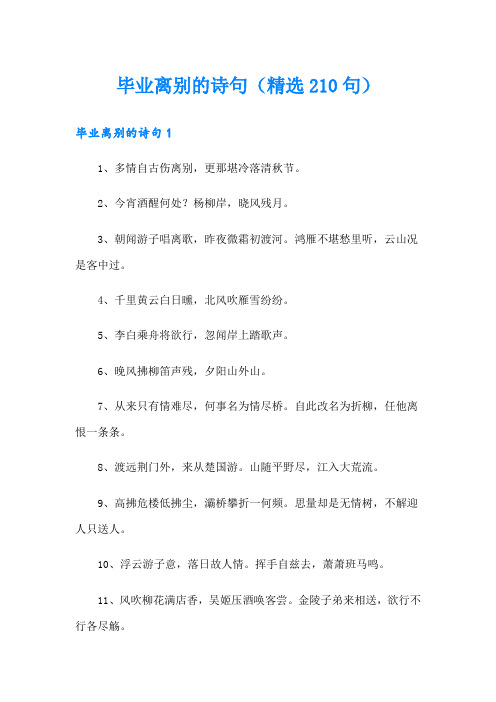
毕业离别的诗句(精选210句)毕业离别的诗句11、多情自古伤离别,更那堪冷落清秋节。
2、今宵酒醒何处?杨柳岸,晓风残月。
3、朝闻游子唱离歌,昨夜微霜初渡河。
鸿雁不堪愁里听,云山况是客中过。
4、千里黄云白日曛,北风吹雁雪纷纷。
5、李白乘舟将欲行,忽闻岸上踏歌声。
6、晚风拂柳笛声残,夕阳山外山。
7、从来只有情难尽,何事名为情尽桥。
自此改名为折柳,任他离恨一条条。
8、渡远荆门外,来从楚国游。
山随平野尽,江入大荒流。
9、高拂危楼低拂尘,灞桥攀折一何频。
思量却是无情树,不解迎人只送人。
10、浮云游子意,落日故人情。
挥手自兹去,萧萧班马鸣。
11、风吹柳花满店香,吴姬压酒唤客尝。
金陵子弟来相送,欲行不行各尽觞。
12、都门帐饮无绪,留恋处,兰舟催发,执手相看泪眼,竟无语凝噎。
13、此地别燕丹,壮士发冲冠,昔时人已没,今日水犹寒。
14、春草明年绿,王孙归不归15、长安陌上无穷树,唯有垂杨管别离。
16、白玉一杯酒,绿杨三月时。
春风余几日,两鬓各成丝。
17、远芳侵古道,晴翠接荒城。
又送王孙去,萋萋满别情。
18、一瓢浊酒尽余欢,今宵别梦寒。
19、渭城朝雨悒轻尘,客舍青青柳色新。
劝君更尽一杯酒,西出阳关无故人。
20、少小离家老大回,乡音无改鬓毛催。
21、山回路转不见君,雪上空留马行处。
22、念去去千里烟波,暮霭沉沉楚天阔。
23、轮台东门送君去,去时雪满天山路。
24、海内存知己,天涯若比邻。
25、孤帆远影碧空尽,唯见长江天际流。
【毕业离别的诗句】毕业离别的诗句21、边月无端照别离,故园何处寄相思。
——纳兰容若《记征人语》2、故人西辞黄鹤楼,烟花三月下扬州。
——李白《黄鹤楼送孟浩然之广陵》3、微官苦绳墨,离别天一隅。
——刘攽《寄傅推官尧俞》4、又是江南离别处,寒烟吹雁不成行。
——方岳《九日道中凄然忆潘邠老之句》5、不用诉离觞,痛饮从来别有肠。
——苏轼《南乡子·和杨元素时移守密州》6、送君思远道,欲以数行洒。
——王维《送张舍人佐江州同薛璩十韵》7、颙望临碧空,怨情感离别。
若再次相见,请沉默以对——以拜伦诗歌《春逝》的不同译本分析古典诗歌的翻译方法
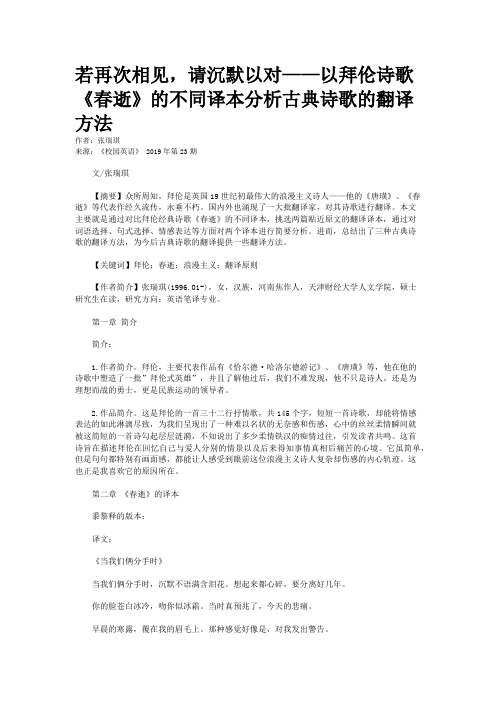
若再次相见,请沉默以对——以拜伦诗歌《春逝》的不同译本分析古典诗歌的翻译方法作者:张瑞琪来源:《校园英语》 2019年第23期文/张瑞琪【摘要】众所周知,拜伦是英国19世纪初最伟大的浪漫主义诗人——他的《唐璜》、《春逝》等代表作经久流传,永垂不朽。
国内外也涌现了一大批翻译家,对其诗歌进行翻译。
本文主要就是通过对比拜伦经典诗歌《春逝》的不同译本,挑选两篇贴近原文的翻译译本,通过对词语选择、句式选择、情感表达等方面对两个译本进行简要分析。
进而,总结出了三种古典诗歌的翻译方法,为今后古典诗歌的翻译提供一些翻译方法。
【关键词】拜伦;春逝;浪漫主义;翻译原则【作者简介】张瑞琪(1996.01-),女,汉族,河南焦作人,天津财经大学人文学院,硕士研究生在读,研究方向:英语笔译专业。
第一章简介简介:1.作者简介。
拜伦,主要代表作品有《恰尔德·哈洛尔德游记》、《唐璜》等,他在他的诗歌中塑造了一批”拜伦式英雄”,并且了解他过后,我们不难发现,他不只是诗人,还是为理想而战的勇士,更是民族运动的领导者。
2.作品简介。
这是拜伦的一首三十二行抒情歌,共145个字,短短一首诗歌,却能将情感表达的如此淋漓尽致,为我们呈现出了一种难以名状的无奈感和伤感,心中的丝丝柔情瞬间就被这简短的一首诗勾起层层涟漪,不知说出了多少柔情铁汉的痴情过往,引发读者共鸣。
这首诗旨在描述拜伦在回忆自己与爱人分别的情景以及后来得知事情真相后痛苦的心境。
它虽简单,但是句句都特别有画面感,都能让人感受到眼前这位浪漫主义诗人复杂却伤感的内心轨迹。
这也正是我喜欢它的原因所在。
第二章《春逝》的译本黍黎释的版本:译文:《当我们俩分手时》当我们俩分手时,沉默不语满含泪花。
想起来都心碎,要分离好几年。
你的脸苍白冰冷,吻你似冰霜。
当时真预兆了,今天的悲痛。
早晨的寒露,覆在我的眉毛上。
那种感觉好像是,对我发出警告。
你抛弃了所有声誉,变得声名狼藉。
我听到别人说你的名字,顿感脸红。
英国诗歌范文
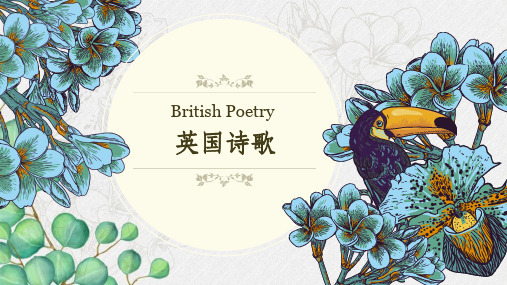
对比 contrast 象征 symbolism
W.B Yeats
评价:
William Butter Yeats was a towering figure in Irish literature and a visionary poet of huge imagination and technical virtuosity.He left a lot of extraordinary works which are mostly about love,lore, and land.
名句:To be ,or not to be—that ia a question
评价:
Shakespare's works started from the real life,a profound reflection of modern style and social nature.His tragedy of these characters profoundly reveals the primitive accumulation of capital has begun to emerge during the various social evils and bourgeois egoism.
T.S Eloit 1888~1965
介绍:
T. S. Eliot, was an American-born British essayist, publisher, playwright, literary and social critic and "one of the twentieth century's major poets".He was awarded the Nobel Prize in Literature in 1948, "for his outstanding, pioneer contribution to present-day poetry".
英美文学口诀(适用于专八考试、研究生入学考试等)
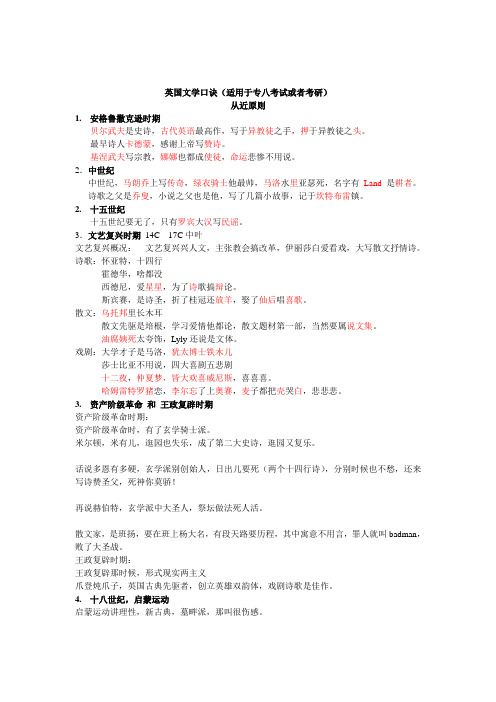
英国文学口诀(适用于专八考试或者考研)从近原则1.安格鲁撒克逊时期贝尔武夫是史诗,古代英语最高作,写于异教徒之手,押于异教徒之头。
最早诗人卡德蒙,感谢上帝写赞诗。
基涅武夫写宗教,娜娜也都成使徒,命运悲惨不用说。
2.中世纪中世纪,马朗乔上写传奇,绿衣骑士他最帅,马洛水里亚瑟死,名字有Land是耕者。
诗歌之父是乔叟,小说之父也是他,写了几篇小故事,记于坎特布雷镇。
2.十五世纪十五世纪要无了,只有罗宾大汉写民谣。
3.文艺复兴时期14C---17C中叶文艺复兴概况:文艺复兴兴人文,主张教会搞改革,伊丽莎白爱看戏,大写散文抒情诗。
诗歌:怀亚特,十四行霍德华,啥都没西德尼,爱星星,为了诗歌搞辩论。
斯宾赛,是诗圣,折了桂冠还放羊,娶了仙后唱喜歌。
散文:乌托邦里长木耳散文先驱是培根,学习爱情他都论,散文题材第一部,当然要属说文集。
油腐姨死太夸饰,Lyly还说是文体。
戏剧:大学才子是马洛,犹太博士铁木儿莎士比亚不用说,四大喜剧五悲剧十二夜,仲夏梦,皆大欢喜威尼斯,喜喜喜。
哈姆雷特罗猪恋,李尔忘了上奥赛,麦子都把壳哭白,悲悲悲。
3.资产阶级革命和王政复辟时期资产阶级革命时期:资产阶级革命时,有了玄学骑士派。
米尔顿,米有儿,逛园也失乐,成了第二大史诗,逛园又复乐。
话说多恩有多硬,玄学派别创始人,日出儿要死(两个十四行诗),分别时候也不愁,还来写诗赞圣父,死神你莫骄!再说赫伯特,玄学派中大圣人,祭坛做法死人活。
散文家,是班扬,要在班上杨大名,有段天路要历程,其中寓意不用言,罪人就叫badman,败了大圣战。
王政复辟时期:王政复辟那时候,形式现实两主义爪登炖爪子,英国古典先驱者,创立英雄双韵体,戏剧诗歌是佳作。
4.十八世纪,启蒙运动启蒙运动讲理性,新古典,墓畔派,那叫很伤感。
新古典:蒲柏为典型,高举理性旗,告诫勿强奸,要不论人又批评。
再说斯蒂尔,死了爹儿还创作,你说理性不理性?还有爱迪生,不搞发明办报纸,弄得观众来闲谈。
主题中的爱情主题
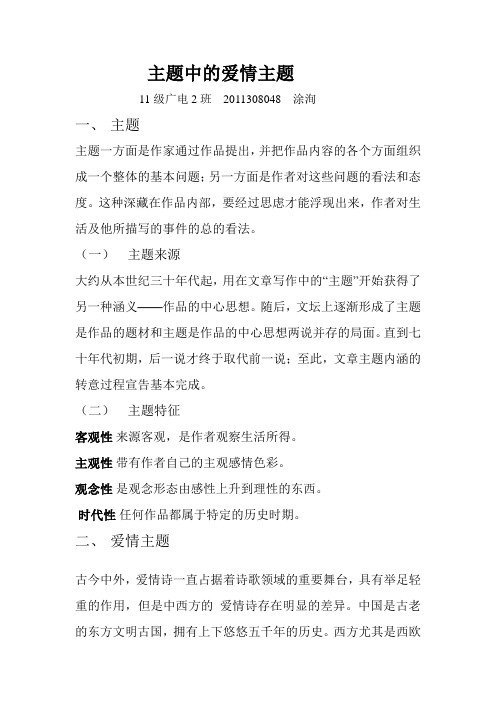
主题中的爱情主题11级广电2班2011308048 涂洵一、主题主题一方面是作家通过作品提出,并把作品内容的各个方面组织成一个整体的基本问题;另一方面是作者对这些问题的看法和态度。
这种深藏在作品内部,要经过思虑才能浮现出来,作者对生活及他所描写的事件的总的看法。
(一)主题来源大约从本世纪三十年代起,用在文章写作中的“主题”开始获得了另一种涵义——作品的中心思想。
随后,文坛上逐渐形成了主题是作品的题材和主题是作品的中心思想两说并存的局面。
直到七十年代初期,后一说才终于取代前一说;至此,文章主题内涵的转意过程宣告基本完成。
(二)主题特征客观性来源客观,是作者观察生活所得。
主观性带有作者自己的主观感情色彩。
观念性是观念形态由感性上升到理性的东西。
时代性任何作品都属于特定的历史时期。
二、爱情主题古今中外,爱情诗一直占据着诗歌领域的重要舞台,具有举足轻重的作用,但是中西方的爱情诗存在明显的差异。
中国是古老的东方文明古国,拥有上下悠悠五千年的历史。
西方尤其是西欧国家地处地中海沿岸,海洋性气候和狭小的生存环境使得人们以海洋生活为主,也随之产生了海洋性文化和西方人直露的性格;中西方爱情诗歌差异北岛和爱伦.坡是处于不同时期不同国度的两位诗人,但其爱情诗《爱情故事》和《安娜贝尔丽》却有惊人的相似性,即对遭遇平庸及灾难后的爱情进行了理性的反思。
(一)孤独中的理性之爱与感性之美从意象营造的角度看“中国古代爱情诗歌的朦胧感与写意性”与“西方爱情诗歌写实刻画和对环境真实再现”例一:《诗经》中的《静女》静女其姝,俟我于城隅。
爱而不见,搔首踟蹰。
静女其娈,贻我彤管。
彤管有炜,说怿女美。
自牧归荑,洵美且异。
匪女之为美,美人之贻。
分析:主人公,一位恬静的女子。
作品并没有具体刻画她是一位如何举止优雅,言语娴淑的姑娘,而是通过“爱而不见”、“彤管有炜”等意象的刻画来加以表现。
读者读到这篇作品的时候,虽然直接描写这位姑娘的词只有“姝”“娈”二字,但其赋予读者的想象空间是无穷的。
- 1、下载文档前请自行甄别文档内容的完整性,平台不提供额外的编辑、内容补充、找答案等附加服务。
- 2、"仅部分预览"的文档,不可在线预览部分如存在完整性等问题,可反馈申请退款(可完整预览的文档不适用该条件!)。
- 3、如文档侵犯您的权益,请联系客服反馈,我们会尽快为您处理(人工客服工作时间:9:00-18:30)。
When We Two Parted(《昔日依依别》)
[原文][译文]
When we two parted 昔日依依惜别,
In silence and tears,泪流默默无言;
Half broken-hearted 离恨肝肠断,
To serve for years,此别又几年。
Pale grew thy cheek and cold,冷颊向愕然,Colder thy kiss,一吻寒更添;
Truly that hour foretold 日后伤心事,
Sorrow to this!此刻已预言。
The dew of the morning 朝起寒露重,
Suck chill or my brow 凛冽凝眉间———
It felt like the warning 彼时已预告:
Of what I feel now.悲伤在今天。
Thy cows are all broken,山盟今安在?
And light is thy fame;汝名何轻贱!
I hear thy name spoken,吾闻汝名传,
And share in its shame.羞愧在人前。
They name thee before me,闻汝名声恶,
A knell to mine ear;犹如听丧钟。
A shudder comes o'er me 不禁心怵惕———
Why wert thou so dear?往昔情太浓。
Thy know not I knew thee 谁知旧日情,
who knew thee too well:斯人知太深。
Long,Long shall I rue thee 绵绵长怀恨,Too deeply to tell.尽在不言中。
In secret we met—昔日喜幽会,
In silence I grieve 今朝恨无声。
That thy heart could forget,旧情汝已忘,Thy spirit deceive.痴心遇薄幸。
If I should meet thee 多年惜别后,
After long years,抑或再相逢,
How should I greet thee ?相逢何所语?
With silence and tears.泪流默无声。
